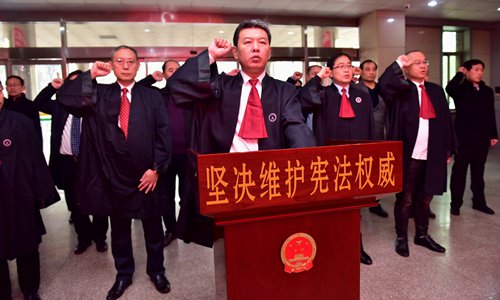China launched the country's first "Constitution Week," scheduled from Sunday to December 8, to help people, especially those living along border areas, gain awareness of their legal rights and interests and root out factors of instability.

(Photo: IC)
To mark the start of the campaign, about 100,000 lawyers from more than 400 cities across the nation, including Hohhot, North China's Inner Mongolia Autonomous Region, took an oath to be loyal to the Constitution, the country and its people, the Ministry of Justice said in a press release sent to the Global Times.
Lawyers from ethnic minorities also made the vow in their ethnic languages.
"The lawyers' oath highlights the supremacy of the Constitution, which is the highest principle for all legal professionals," Xu Xin, a professor at the Beijing Institute of Technology's School of Law, told the Global Times on Monday.
"China is ruled by the Constitution. The campaign allows people to get closer to the law and integrate it into everyday life," Xu said.
The event is part of a month-long publicity campaign for China's fifth Constitution Day, which falls on Tuesday, according to a circular issued jointly by the Publicity Department of the Central Committee of the Communist Party of China, the Ministry of Justice and the national office for law popularization.
A video on the rule by law was shown in the square in front of the Potala Palace in Southwest China's Tibet Autonomous Region Tibet on Monday.
More campaign-related activities, including vowing loyalty to the Constitution, contests about the law, and exhibitions, will be held starting Tuesday, local news site tibet.cn reported.
"People will realize that the Constitution cares and protects their legal rights and interests," Xiong Kunxin, a professor of ethnic studies at Beijing-based Minzu University of China, told the Global Times on Monday.
Copies of the Constitution in different ethnic languages would be delivered to border areas, including the Tibet Autonomous Region and the Xinjiang Uyghur Autonomous Region.
"The activities will help people from minority ethnic groups gain legal awareness and identify China as their motherland, and thus will see the difference with extremism and separatism," Xu Jianying, a research fellow at the Chinese Academy of Social Sciences' Research Center for Chinese Borderland History and Geography, told the Global Times.
"Events that disrupted stability happened because people living there had relatively fewer chances to learn about laws and policies that benefit them. This campaign could remedy that weak spot and also help root out the possibility of people maliciously using it," Xiong noted.


